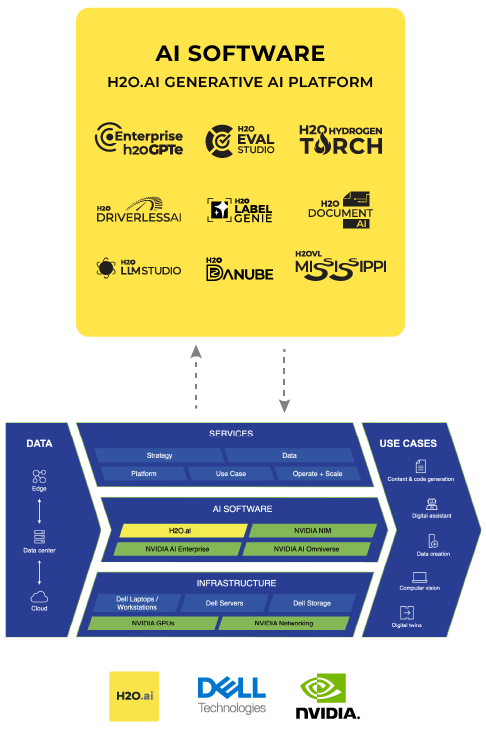H2O.ai generative and predictive AI now validated on Dell AI Factory with NVIDIA
On-premise and airgapped purpose-built AI applications for Dell customers
H2O.ai is validated and pre-integrated into Dell AI Factory for ease of scale and deployment. Accelerate time to market for use case-driven AI applications with Multimodal RAG.
Leverage private, protected data to fine-tune or retrieve-augment-generate (RAG) domain-specific LLMs for multi-agent intelligent systems.


H2O.ai running on Dell AI Factory with NVIDIA
Industry's first end-to-end enterprise AI solution to converge generative and predictive AI
On-premise and airgapped purpose-built AI applications for Dell customers
Agentic AI
use private, protected data to fine-tune or apply retrieval-augmented generation (RAG) for domain-specific LLMs in multi-agent intelligent systems
Reduce TCO
with choice of on-premise or hybrid deployment of applications with DELL AI Factory
Accelerate time to production
with pre-integrated technologies
End-to-end AI
solution
with use case development from exploration to inferencing
H2O.ai ON DELL AI FACTORY USE CASE HIGHLIGHTS
ProcurementGPT
BUSINESS PROBLEMS
One of the critical challenges in procurement is ensuring that contracts exchanged between organizations, such as banks and suppliers, are aligned and free from discrepancies.
NEEDS
Need efficient, reliable tools to review contracts, manage supplier relationships, and maintain regulatory compliance, where human oversight may overlook critical contractual clauses.
- Parse documents
- Identify sections
- Break down + identify requirements
- Requirements met
- Symmetry
- Select sections
Complaint Summarizer
BUSINESS PROBLEMS
Manual processing and analysis of customer complaints can lead to missed insights and delayed resolutions. A complaint summarizer addresses these challenges by automating sentiment analysis, identifying trends, distilling recurring themes, and prioritizing urgent issues with timely feedback.
NEEDS
Faster grievance resolution and effective regulatory response. Key metrics include faster resolution times, improved first-contact resolution, and accurate complaint classification and sentiment analysis. Benefits include reduced complaint volume, higher productivity, and cost savings through automation.
- RAG workflow
- Complaints by state
- Summarizer + topic extractor
- Summary + recommendation
- LLM Agent
Enterprises are demanding AI solutions that are trustworthy, cost effective and purpose-built for domain specific use cases, and with H2O.ai, we’re delivering on that demand. The Dell AI Factory with NVIDIA and H2O.ai helps organizations deploy AI on-premises with unmatched control and cost efficiency.”
Chad Dunn
Vice President, Product Management, AI and Data Management
Dell Technologies



















